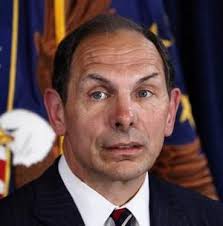The U.S. Department of Veterans Affairs has a lot of trouble staying out of the news. Rocked by scandal after scandal, the agency brought in a new top gun (no pun intended) to improve efficiency and to give the veterans a fair shake.

Robert McDonald: Special Forces Blunders.
The new Secretary of Veterans Affairs, Robert McDonald, came to the bureaucracy with pretty impressive credentials; after all, he was the former CEO of the Proctor & Gamble Company. He is also a veteran who served with the 82nd Airborne Division and was U.S. Army Ranger. That training is rigorous and tough, and McDonald is to be admired for his service.
However, he was not a member of the Special Forces. It may sound un-important to a non-military person, but it carries a lot of weight to a soldier.
In an article for Reuters (February 24, 2015) entitled: “U.S. Veterans secretary apologizes for misstating military service: ABC News,” we pick up on an interesting exchange.
“He was in Los Angeles last month speaking to a homeless man during a campaign to identify vagrant veterans when he made the [following] comment, ABC News reported citing a statement from the Secretary.
‘I asked the man where he had served in the military,’ McDonald said, according to ABC News. ‘He responded that he had served in Special Forces. I incorrectly stated that I had been in Special Forces. That was inaccurate and I apologize to anyone that was offended by my misstatement.’”
The politics of the photo-op
I have no doubt that McDonald was trying to have his heart be in the right place. The problem with photo-op’s and sound bites (as both Brian Williams and Bill O’Reilly have recently found out), is that the truth has a way of coming around to bite us.
The homeless guy McDonald was trying to impress was down on his luck; he was an easy sound-bite and a photo-op, but to know veterans is to understand that despite all that has transpired in their lives, their service is sacred.
If you have no frame of reference here, imagine you are a licensed CPA and being at a conference with many financial people. You meet someone who says, “You’re a CPA? I’m one too!” Except you later learn she took a couple of classes in accounting but never sat for the CPA exam or took any of the required courses.
Special Forces is a tough and elite group. Men (and women) who make it through training and into combat have accomplished something major. To overstate one’s record to impress a man who has fallen down and spiraled down to the depths of despair is cruel. McDonald has “touched the sky,” and very good for him, but guess what? Not everyone has it the same. Some people fall into PTSD, others to alcoholism or drug abuse after the service chews them up.
The former CEO of a major company who took over the reins at a major bureaucracy is used to power and privilege. Not everyone has his ability to climb that ladder. Then again, McDonald has not seen what this homeless man has seen or experienced what the homeless man experienced.
Ethically, I fear many of those who pass through our lives are adopting embellishment over truth. It is as though there is a fear that the truth is not good enough. It is also an attempt to allow arrogance triumph over humility. Embellishment is buying, rather than earning a commendation or medal. Embellishment is pretense
All the homeless man had was his truth; as meager and as distant as it was. The former CEO had almost everything except his truth. The two met as the bureaucrat was looking for the photo-op opportunity of the week. He found it, but it seems to have back-fired and became an apology.
What happens if we don’t change?
It all leads us to a basic ethical question. If all of us were to embellish, where would it lead us? I think the biggest victim might be the destruction of empathy.
I cannot imagine a task more empathic than reaching out to veterans who have fallen through the societal cracks; men and women who have given up on life and who truly need someone to pull them up.
Here the head of the Veteran’s Administration had a chance to connect on a simple and human level. Perhaps sounding impressed with the homeless man’s military history; perhaps telling the homeless man that his life mattered and that he would get the help he needs.
Instead – unfortunately, then chief executive of the organization made it mostly about himself (he was in Special Forces too!). Empathy flew out the window along with a good sense of ethics, and the homeless man’s spiral was pushed down even further.
What do you think?


